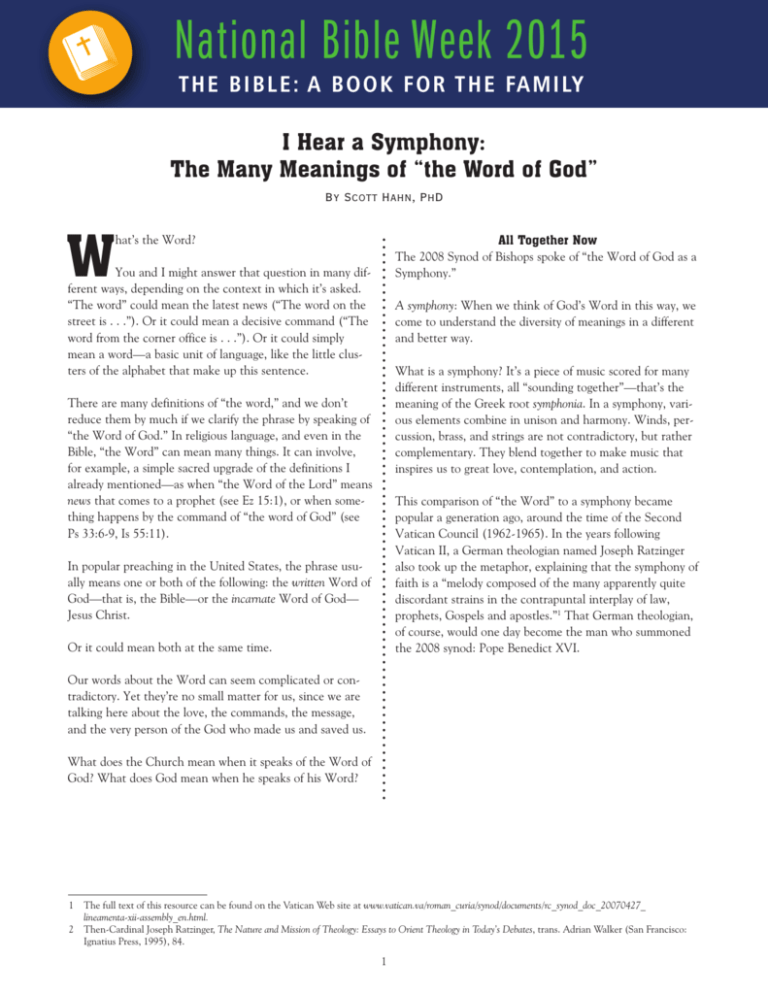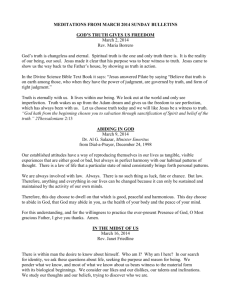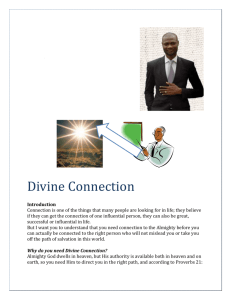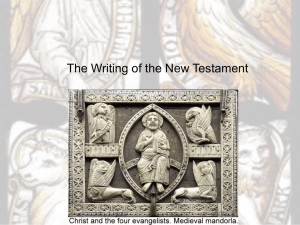
I Hear a Symphony:
The Many Meanings of “the Word of God”
By Scott Hahn, PhD
W
hat’s the Word?
All Together Now
The 2008 Synod of Bishops spoke of “the Word of God as a
Symphony.”
You and I might answer that question in many different ways, depending on the context in which it’s asked.
“The word” could mean the latest news (“The word on the
street is . . .”). Or it could mean a decisive command (“The
word from the corner office is . . .”). Or it could simply
mean a word—a basic unit of language, like the little clusters of the alphabet that make up this sentence.
A symphony: When we think of God’s Word in this way, we
come to understand the diversity of meanings in a different
and better way.
What is a symphony? It’s a piece of music scored for many
different instruments, all “sounding together”—that’s the
meaning of the Greek root symphonia. In a symphony, various elements combine in unison and harmony. Winds, percussion, brass, and strings are not contradictory, but rather
complementary. They blend together to make music that
inspires us to great love, contemplation, and action.
There are many definitions of “the word,” and we don’t
reduce them by much if we clarify the phrase by speaking of
“the Word of God.” In religious language, and even in the
Bible, “the Word” can mean many things. It can involve,
for example, a simple sacred upgrade of the definitions I
already mentioned—as when “the Word of the Lord” means
news that comes to a prophet (see Ez 15:1), or when something happens by the command of “the word of God” (see
Ps 33:6-9, Is 55:11).
This comparison of “the Word” to a symphony became
popular a generation ago, around the time of the Second
Vatican Council (1962-1965). In the years following
Vatican II, a German theologian named Joseph Ratzinger
also took up the metaphor, explaining that the symphony of
faith is a “melody composed of the many apparently quite
discordant strains in the contrapuntal interplay of law,
prophets, Gospels and apostles.”1 That German theologian,
of course, would one day become the man who summoned
the 2008 synod: Pope Benedict XVI.
In popular preaching in the United States, the phrase usually means one or both of the following: the written Word of
God—that is, the Bible—or the incarnate Word of God—
Jesus Christ.
Or it could mean both at the same time.
Our words about the Word can seem complicated or contradictory. Yet they’re no small matter for us, since we are
talking here about the love, the commands, the message,
and the very person of the God who made us and saved us.
What does the Church mean when it speaks of the Word of
God? What does God mean when he speaks of his Word?
1
2
The full text of this resource can be found on the Vatican Web site at www.vatican.va/roman_curia/synod/documents/rc_synod_doc_20070427_
lineamenta-xii-assembly_en.html.
Then-Cardinal Joseph Ratzinger, The Nature and Mission of Theology: Essays to Orient Theology in Today’s Debates, trans. Adrian Walker (San Francisco:
Ignatius Press, 1995), 84.
1
In Jesus, God’s Word became “a man like us in all things
but sin” (Eucharistic Prayer IV). In Scripture, God’s Word
is expressed in human words, but without the fallible qualities we usually associate with human literature. It is inspired
by God, authored by God, and so it is given a certain
authority by God. In the words of the Lineamenta, “Through
the charism of divine inspiration, the Books of Sacred
Scripture have a direct, concrete power of appeal not
possessed by other texts or holy writings.”
Fully Divine, Fully Human
The Word of God resounds like a symphony. There is
nothing monotonous about it. God has spoken to us “in
partial and various ways” (Heb 1:1). He speaks to us in the
wonders of creation, for he made the universe through his
eternal Word (Jn 1:3). He speaks to us in the written story
of creation and salvation that we find in the Bible—in the
law, prophets, Gospel, and Apostles.
Yet all these various strains harmonize perfectly in the person of the Word made flesh, Jesus Christ. The Catechism
of the Catholic Church (CCC)2 echoes St. Augustine as it
explains: “Through all the words of Sacred Scripture, God
speaks only one single Word, his one Utterance in whom
he expresses himself completely” (CCC, no. 102). Jesus
himself is the revealed Word of God, and he in turn has
revealed himself to be the subject of “all the Scriptures” (see
Lk 24:27). All of the Bible is about him, even the parts that
were written many centuries before he was born. It is Jesus
who makes the Bible one book, and even “one Word.”
Both the Incarnation and the Inspiration of the Word are
divinely revealed mysteries, known only by faith. We could
never demonstrate them simply by logic or science. We
could not have known them apart from God’s Revelation
and the gift of faith.
The Word in Full
So important are our Scriptures that they are sometimes
misrepresented as the centerpiece of our religion. Journalists
and even scholars will sometimes characterize Christianity
as a “religion of the book.”
For Jesus truly, completely, and perfectly embodies the
Word of God. That’s what we mean when we speak of the
truth at the heart of our faith: the Incarnation. “The Word
became flesh and made his dwelling among us” (Jn 1:14).
But that’s a misunderstanding. In fact, the Catechism explicitly rejects that idea, stating clearly that “the Christian faith
is not a ‘religion of the book.’” Then it goes on to make the
necessary distinction: “Christianity is the religion of the
‘Word’ of God, a word which is ‘not a written and mute
word, but the Word which is incarnate and living’” (CCC,
no. 108).
In that event, God communicated himself completely.
Yet even then he spoke to us in words. Jesus spoke. He
preached. He counseled. He taught. He prayed aloud. He
asked questions. He told stories. He even traced words in
the sand. He did all of this for our sake, because words are
a normal human thing. Nevertheless, his words are extraordinary, because they are revelatory. They are human words
that reveal the eternal Word of God. They are the Word of
God in the words of men and women and children.
We encounter not a dead letter, but a person: the “Word
of God . . . living and effective” (Heb 4:12). This is not
a word we can manipulate or spin to suit our whims. It is
Jesus Christ, who comes with a fearsome power over all the
elements, over life and death. “His eyes were [like] a fiery
flame, and on his head were many diadems. . . . He wore
a cloak that had been dipped in blood, and his name was
called the Word of God” (Rev 19:12-13).
Beginning with this premise, the document for the synod
encourages us to think of “the Word” in this “analogous
sense.” We may look for relations of resemblance between the
Word inspired (Scripture) and the Word incarnate (Jesus).
The Church, in preparation for the synod in 2008, wants to
make sure that we make no mistake about it. Our religion is
not reducible to the printed pages of our sacred book. The
Lineamenta warns us to avoid “erroneous or over-simplistic
approaches and any ambiguity.”
Both are fully divine and fully human. Jesus is true God and
true man. He is coeternal with the Father; yet he was born
of the Virgin Mary. St. Thomas Aquinas said that “Christ’s
humanity is the instrument of his divinity.” In a similar way,
the words of the Bible are instruments of the Word of God.
Tradition speaks of the Scriptures as “the Word of God in
the words of men.” Yet in both the Incarnation and the
Inspiration, the divine agent and the human instrument are
inseparably united.
Instead, we are invited to listen to the Word of God in
all its symphonic richness. The Word comes to us in the
Scriptures, yes, but also in the life and sacred Tradition
of our community of faith. This is how the first Christians
received the Word of God. Their faith was certainly not
2 Catechism of the Catholic Church (2nd ed.) (Washington, DC: Libreria
Editrice Vaticana–United States Conference of Catholic Bishops, 2000).
2
reducible to a book, because there was not yet a book for
them to read. They had no New Testament; it had yet to
be written. It would take centuries, in fact, before the New
Testament was published as a single book. What’s more,
very few of those early Christians could read well enough
to study even the Old Testament, and still fewer could
afford to own books in those long-ago years before the
printing press.
There was a place where the Apostles normally preached
and where the congregation read the apostolic letters aloud.
That place was the liturgy. Twice in the second chapter of
the Acts of the Apostles we read about “the breaking of
the bread” as the distinctive Christian activity: “And they
devoted themselves to the teaching of the apostles and to
the communal life, to the breaking of the bread and to the
prayers” (Acts 2:42). The motif recurs often afterward, and
it continues throughout the surviving documents of those
early centuries. The early Church was a Eucharistic Church.
But they all—regardless of income or abilities—received
the living Word of God in the heart of the Church. They
received the Word in his body, alive on earth, the Church.
St. Paul makes clear that the written text was just one way
the Word lived in the Church. He told the Thessalonians,
“Hold fast to the traditions that you were taught, either by
an oral statement or by a letter of ours” (2 Thes 2:15).
So, for Paul and his hearers, tradition and “word of mouth”
were as authoritative as Holy Writ. The life of the Church
was much more than a book study. It was the life
Christ gave to the Apostles, the living faith of the
Catholic Church.
In the ritual public worship of the Church, Christians
encountered the Word of God. It was not simplistic; it was
symphonic. The people received the Word of God present
in the inspired Scriptures, proclaimed in the readings from
the Old Testament and the New. They received the Word
of God in the inspired preaching of Christ’s priests. The
people received the Word of God in his true flesh as they
received the sacramental elements. They received the Word
of God in his body, the assembled Church.
Again, we see in the New Testament that the Apostles
gave the Christian Church so much more than texts. They
passed on rituals (see 1 Cor 11:23); they pronounced blessings (Acts 6:6); they conveyed authority (Acts 13:3); they
healed the sick (Acts 28:8). The Second Vatican Council,
in its Dogmatic Constitution on Divine Revelation (Dei
Verbum)3 speaks of the fullness of Christian living—the fullness of the tradition—the fullness of the symphony: “What
was handed on by the Apostles comprises everything that
serves to make the People of God live their lives in holiness
and increase their faith. In this way the Church, in her
doctrine, life and worship, perpetuates and transmits to
every generation all that she herself is, all that she believes”
(no. 8).
Indeed, it is by the Word of God that bread can be transformed into the very flesh of Christ, and that mere mortals
can be transformed into Christ’s immortal body.
How can that be? How can a Word possess such power?
Let’s return to our analogy. God’s Word is like our words
in many ways. It is expressive and informative. But God’s
Word is unlike ours, too, because it is divine. Our words
merely stand for things. When I speak of roses, I may evoke
a bouquet in your imagination, but my words lack the power
to drop even a single petal into your hand.
God’s Word, on the other hand, has the power to accomplish the very things that it signifies. You and I write words
on paper. But God writes the world the way we write words.
He does so simply by the power of his Word: “the Lord
commanded and they were created” (Ps 148:5).
Mass Media
But it’s fair for us to ask: How did it all happen? Where did
it all happen for those first Christians?
The Word in its fullness is a powerful thing, a fearsome
thing. But that, too, is a quality of great symphonies.
Beethoven’s Fifth and Ninth will shake us to our souls if we
let them. A great composer can stoke the fires of love and
courage. A great composer can rouse a nation with a song.
A great composer can drive us to mighty deeds.
We ask because we know that the answer to those questions should have some bearing on the way we receive the
Word of God today.
The New Testament makes clear that there was indeed a
place where the Church ordinarily encountered the Word.
There was a place where the Scriptures were regularly proclaimed and the rites were enacted in the customary ways.
But all that is nothing compared to what God wants to
accomplish through his Word. God wants us to be, in
Christ, a new creation. We do not merely hear the eternal
3 Second Vatican Council, Dogmatic Constitution on Divine Revelation (Dei
Verbum), in Vatican Council II: Volume 1: The Conciliar and Post Conciliar
Documents, ed. Austin Flannery (Northport, NY: Costello Publishing,
1996).
3
Word. We are baptized into the very life of the eternal
Word. We come to “share in the divine nature” (2 Pt 1:4).
We participate in the symphony, not as spectators or listeners, but as performers. We speak it. We pray it. We ponder
it. We make the Word our own through our full, conscious,
and active participation in the liturgy. And then we take
that Word out into the world. The Word makes us his own;
he gives us his flesh and blood to be our own.
Let it shake you like no symphony ever has. Let the timpani rattle your soul and bring you to your feet in glory and
praise. Like Paul, I want to tell you a mystery (1 Cor 15:51)
and, indeed, many mysteries all at once, for there is mystery
enough for everyone to possess and to enjoy. As St. Thomas
Aquinas said, the Scriptures contain “many senses under
one letter,” the better to suit the full range of intellectual
gifts in the human race—“so that everyone,” he explained,
“may marvel that he is able to find in Sacred Scripture the
truth that he has mentally conceived.”
So that great and fearsome life is not just something “out
there” in heaven. It is the very life we live today as children
of God. For the Word of God is the Son of God by nature;
and it is that very nature he came to share with us through
the Church. It’s his life that we receive from the Church,
and it’s his life that we live in the Church, in all its symphonic richness.
It’s a mystery that human words can be inspired as they
are in the Sacred Scriptures. It’s a mystery that the Divine
Word could become incarnate and dwell among us. It’s a
mystery that we can share in a Word that is infinite and
eternal, though we are finite and mortal.
But that’s the mystery God has given us. It’s the Word from
above, but it’s also the Word on the street. And that, in a
Word, is the Good News.
Adapted from an article written for Catechetical Sunday 2008. Copyright © 2015, 2008, United States Conference of Catholic Bishops,
Washington, DC. All rights reserved.
Permission is hereby granted to duplicate this work without adaptation for non-commercial use.
4








